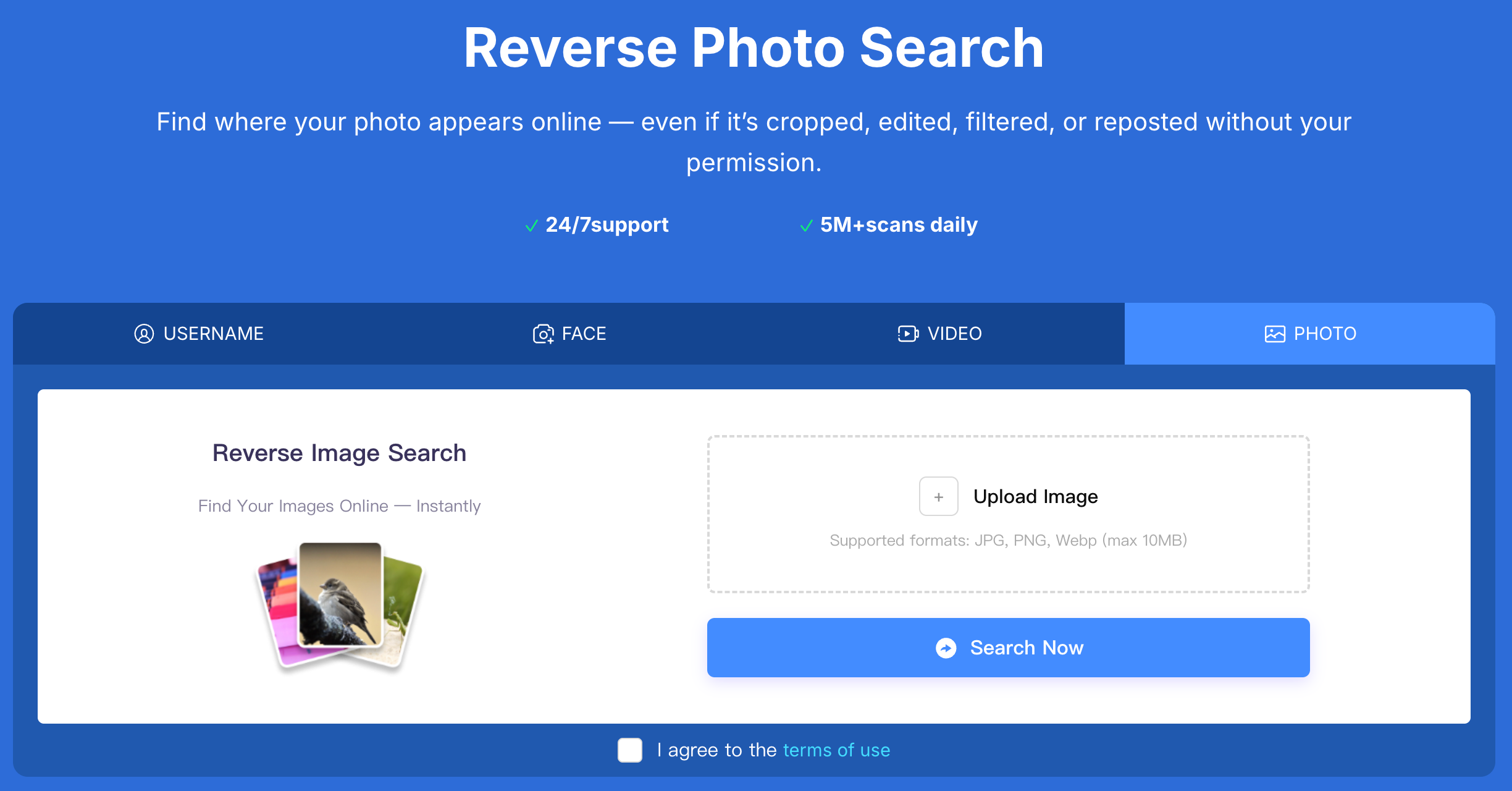Looking for a PimEyes face search alternative? This page lists reliable options and explains which tools work better for privacy, social media image checks, and misuse detection.
Find Where Your Photo Appears Online with Reverse Image Search
Table of Contents
In an online world where images move faster than you can react, discovering that someone posted your photo without permission can feel unsettling. Whether it’s a selfie, a professional headshot, or a casual picture taken at an event, reverse image search gives you a way to track where your photo appears—and take back control.
Why Photos of a Person Get Reposted Without Consent
Most people never expect to see their photo appear somewhere they didn’t upload it. Yet it happens more often than you think:
- Profile pictures scraped from Instagram, TikTok, or LinkedIn
- Selfies reused by impersonation or scam accounts
- Photos uploaded to meme pages or public forums
- Creators’ or models’ images appearing on fan pages they don’t control
- Old photos resurfacing after being indexed by search engines
These aren’t necessarily “sensitive content” cases—but they still impact your privacy, identity, and professional reputation.
How Reverse Image Search Helps You See Where Your Photo Appears Online
Reverse image search checks where a picture of a person appears across the public internet—even if the uploader didn’t credit, tag, or mention you.
It can reveal:
- Reposts of your selfies on social platforms
- Duplicate uploads on blogs, forums, or community sites
- Someone using your face as a profile picture
- Fake dating profiles pretending to be you
- AI-generated avatars or identities built from your photo
A quick scan can uncover patterns of misuse you aren’t aware of—and tools like Erasa make it easier to detect reposts on platforms that traditional search engines don’t index.
When You Should Run a Reverse Image Search
You don’t need to wait for something suspicious to happen. Run a search when:
- A friend sends you a screenshot of an unfamiliar profile using your picture
- You see someone online who looks suspiciously similar to you
- You're applying to jobs and want to maintain a clean online presence
- You're a creator or model and need visibility into how your images circulate
- You want to check whether old photos are resurfacing on new platforms
Reverse image search is not only reactive—it’s preventative.
Best Tools to Track Where Your Photo Is Being Used
Different tools excel at different types of photo matching:
Google Images — Good for public reposts
Strong for detecting indexed images, but weaker at face similarity.
TinEye — Good for edited or resized versions
Useful for detecting altered copies or recompressed uploads.
Yandex Images — Strong at facial matching
Often surfaces visually similar faces, even with filters.
Erasa Reverse Image Search — Best for impersonation and small-platform misuse
Erasa detects uncredited reposts, modified images, and accounts using your face or photos—even on platforms Google doesn’t index.
Reverse Face Search vs. Reverse Image Search (And When You Need Each)
Most people assume reverse image search and face search are the same—but they solve different problems.
Reverse image search
Matches visual layout, colors, and objects.
Useful for: reposts, edited versions, thumbnails.
Reverse face search
Matches your face across different photos—even if cropped, filtered, compressed, or resized.
Useful for:
- Fake profiles
- Catfishing on dating apps
- People using your selfies as avatars
- AI-generated lookalikes
➡️ If Google or TinEye can’t find matches, it’s likely because they don’t support true face-matching.
Learn more in Why Reverse Image Search Won’t Find Your Face.
Step-by-Step: How to Track Where Your Photo Appears Online
Step 1 — Upload your photo to a reverse image tool
Use a selfie, headshot, or screenshot of the profile photo you want to investigate.
Step 2 — Review all reposted, similar, and visually matched results
Look carefully at usernames, bios, and linked accounts.
Step 3 — Identify any suspicious accounts or unauthorized uses
Check dating apps, social platforms, forums, and unfamiliar profiles.
Step 4 — Report or request removal
Most platforms have built-in forms for impersonation and photo misuse.
Step 5 — Document everything
Take screenshots and save URLs before the uploader deletes the content.
Common Forms of Non-Sensitive Photo Misuse
You don’t need to be a public figure for your photo to be misused. Common examples include:
- Someone using your selfie for a fake dating profile
- Business scam pages using LinkedIn headshots
- Photos reposted on meme accounts without credit
- Old photos scraped from social media being uploaded elsewhere
- AI tools generating avatars using your face
These scenarios can cause confusion, identity issues, and reputational harm—even if they aren’t tied to explicit content.
How to Get a Photo of You Removed from the Internet
Most platforms allow you to request removal when your photo is used without your permission.
You can:
- Report impersonation on social media
- Submit privacy-violation requests
- File a DMCA removal notice
- Ask site moderators to remove posts or threads
- Track whether new copies appear after removal
Some cases may resolve quickly; others require persistence and tracking repeated reuploads.
How to Protect Your Photos from Future Misuse
A proactive approach makes a big difference:
- Add subtle watermarks to professional headshots or modeling photos
- Restrict public visibility of images with recognizable backgrounds
- Run monthly reverse searches to stay ahead of misuse
- Avoid posting high-resolution images publicly
- Use monitoring tools that alert you when new matches appear
Your online presence evolves constantly—your protection strategy should too.
Try Erasa to See Where Your Photo Appears Online
If you want a clearer view of how your photos circulate online, Erasa offers a privacy-safe way to detect reposts, impersonation profiles, altered images, and small-platform usage.
Upload a picture, review your matches, and decide whether you want to request removal—all in one place.

FAQ: Reverse Searching a Photo of Yourself or Someone Else
Q1: Can I track who posted my picture online?
Yes. Upload your photo to a reverse image tool and review all matched results to find accounts or sites using it.
Q2: Can I reverse search a screenshot of a photo?
Yes. Even low-resolution or cropped screenshots can surface useful matches.
Q3: How do I find out if someone is pretending to be me?
Run reverse searches on your selfie or headshot, and check for profiles using your face.
Q4: Can reverse image search find old photos of me?
If the image is indexed or reposted publicly, yes.
Q5: Can I check if my photo is used on dating apps?
Indirectly—most dating apps aren’t indexable, but you may find the same photos reused elsewhere.
Q6: Why does Google sometimes fail to find photos of people?
Google doesn’t support true face-matching.
Looking for PimEyes alternatives? Compare safer reverse face search options, understand privacy concerns, and find tools better suited for tracking fake profiles or reused photos.
Learn how to check if your video has been leaked, where stolen videos usually spread, and what to do if your content is reposted without permission.
Reverse image search can’t identify faces. Learn why it fails, how face-search tools work, and how to find where your photos or identity appear online.
Learn why your Twitter (X) reach suddenly dropped. This guide explains the real reasons behind shadowbans and how to confirm your visibility status in minutes.
Learn where to sell feet pics safely, choose secure feet websites, avoid scams, and protect your photos from leaks with smart creator strategies.
